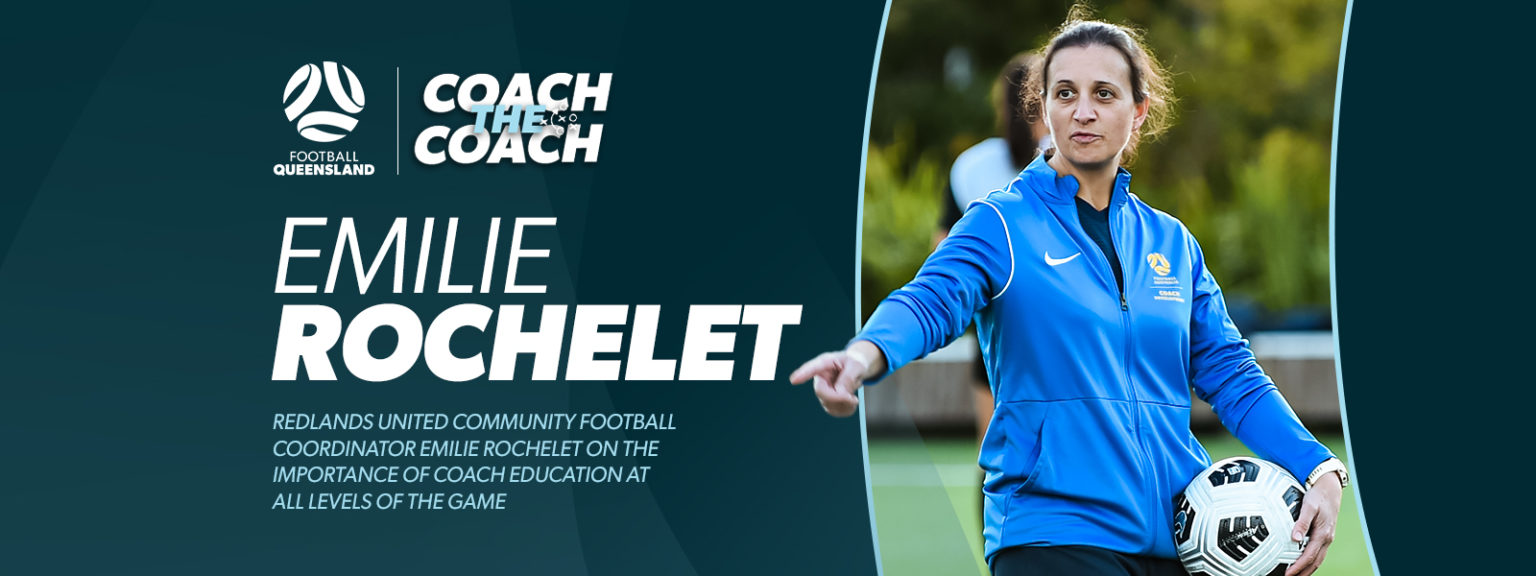In this month’s edition of Coach the Coach, Football Queensland caught up with Redlands United Community Football Coordinator Emilie Rochelet to discuss the importance of coach education at all levels of the game.
Born and raised in France, Rochelet first started playing in the youth development program at Olympique Lyonnais before joining a scholarship program at the age of 16 to play in America for a year.
Once she returned to France, she played with Lyon for another four seasons and decided to focus on her studies, finishing her Bachelor in Human Movement and Master in Exercise Science degrees.
She credited her experience in Lyon and in America as a launchpad into coaching, before moving to Redlands United in 2016.
“With my coaching, I was lucky to be part of different development programs. At Lyon, I was coaching the young players of U9 and U12 players,” Rochelet said.
“When I was in America, I coached junior girls, so that was a good experience there too and I learned a lot.”
In her current role as Community Football Coordinator, Rochelet explained her focus on organising football programs within the community space.
“When I started, I really wanted to set up a development program for community players for those not quite ready for SAP, but for those who love football and want to push their development,” she said.
“Now that’s called the ‘Red Program’ and it’s been very good with engagement from players and coaches as well. So I’m very happy with that because it’s just an idea of providing opportunities within the club.
“Obviously because I love coaching, I also took the role as a head coach for U11 SAP and I just love that age group with youth development, so I’ve been enjoying that as well.”
While her role demands organisation, Rochelet explained her passion for coach education as a driving factor for improving processes within the club’s coach development pathway.
“If you can provide good support for the coaches, then they will set up a good environment for players to enjoy their football as well,” she said.
“When I’m talking to coaches, what I really try to get through is for the kids to have fun, and that really should be happening at any level you’re playing.
“If you’re not having fun, that’s when we lose players, so whatever we put in place, the main thing is just make sure that players have a fun and positive experience of it. That’s how we grow our squads.”
In May, Rochelet attended an in-person, joint FIFA-Football Australia Coach Educators’ Development Pathway Program, which provided key learnings she looks forward to implementing at Redlands.
“I was very lucky to have that opportunity and it just reinforced my love coaching within that space. It was great to share with my peers and learn from the best coach educators around so that was fantastic,” she said.
“Part of it was learning how to engage more with the coaches and learning how to engage with observing practice sessions, and being proactive in player engagements as well through a more self-reflective approach.”
When asked how she hopes to implement this within her current role, Rochelet explained that it comes down to providing more support for coaches.
“In the community space [at Redlands], I’ve been giving session plans to coaches and I’ve been helping them through those plans to understand what they are, and what actions they need to take.
“Instead of just giving a session plan, observing a course and giving some feedback, I really want to support coaches more with engaging within the game and engaging with players.
“So, I’ve been changing my approach now and it’s still in process, but I’ve got a different perspective than what I used to have.”
Rochelet also noted the importance of coaches putting self-reflection into practice as players do.
“As a coach, I always encourage players with questioning, and I want them to self-reflect and think about what they’re learning.
“But I never really put that into practice for coaches, which really opened my eyes and made me think, ‘why wouldn’t you do that?’
“So I’m definitely looking forward to implementing that more self-reflective approach because I can see the benefits of it.”
When reflecting on the value of coach educators within clubs, Rochelet acknowledged the benefits that are delivered to participants at all levels of the club.
“It’s a really crucial role because it allows the club to have a bit of a standard within their football, across all levels,” she explained.
“But if you look at the bigger picture, if every club has a coach educator, you will have better coaches and then that will produce better players. Hopefully that practice goes all the way through the states and even nationally, to increase the level of football as a nation.”
Rochelet encouraged Queensland coaches interested in moving into the coach education space to explore the opportunities and pathways that are in place.
“Getting involved in community courses within your own club and just observing from other coaches is a good starting point,” she said.
“If you want to pursue it further, definitely look at reaching out to Football Queensland, and see what’s possible and what pathway is there.”
















